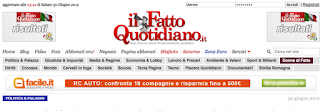While print newspapers are losing subscribers and advertisers in the rest of Europe, an Italian print publication launched by an investigative reporter is thriving because of its independent voice.
Il Fatto Quotidiano (The Daily Facts) has been slaying sacred cows since 2009 and makes its money from subscribers and newsstand sales -- roughly 6 million euros in profit in both 2010 and 2011. Part of its success may be attributable to its opposition to then-Prime Minister Silvio Berlusconi, whose control of a vast media empire tended to stifle criticism of his administration.
As of June last year (the latest figures available), Il Fatto had circulation of 127,000 daily, with 42,000 subscribers (at 290 euros annually), with the rest sold on newsstands. Earlier this year it reported 450,000 unique users daily for its online edition.
The fact that a print publication supported by subscribers could thrive
amid a worldwide economic downturn and a collapsing economic model for
print seems remarkable.
Saturday, June 30, 2012
Tuesday, June 19, 2012
10 commandments for digital news entrepreneurs

Versión en español aquí.
I have been inspired by a book about 13 new digital media launched in Spain by entrepreneurial journalists.
The book -- Microperiodismos: Aventuras Digitales en Tiempos de Crisis -- profiles some news organizations that are defying the voices of pessimism, the economic crisis in Spain and competition from the traditional media.
The authors, Eva Domínguez y Jordi Pérez Colomé, compiled 13 stories of journalists motivated by passion, service to the community and a search for alternatives to working for big media companies.
Labels:
business models,
entrepreneurial journalism,
layoffs,
Spain,
tips
Thursday, June 14, 2012
In New Orleans, nostalgia is not good for journalism
Let's not cry any more about the decision of Advance Publications, a profit-driven enterprise, to reduce its newspapers in New Orleans and Alabama to publishing three days a week. It is sad for the people who were laid off, and we who love print are disappointed.
But this was inevitable. The big newspaper chains have shown little interest in adjusting to the new digital news competition. Instead they have continued to squeeze whatever they can out of print for as long as they can, prolonging the agony through layoffs rather than investing significantly in digital.
As proof of the lack of investment, Mathew Ingram points out that Advance's newspapers have awful websites, including the one for my hometown newspaper, the Cleveland Plain Dealer. (Will it be the next one to go to three days a week?)
But this was inevitable. The big newspaper chains have shown little interest in adjusting to the new digital news competition. Instead they have continued to squeeze whatever they can out of print for as long as they can, prolonging the agony through layoffs rather than investing significantly in digital.
As proof of the lack of investment, Mathew Ingram points out that Advance's newspapers have awful websites, including the one for my hometown newspaper, the Cleveland Plain Dealer. (Will it be the next one to go to three days a week?)
Labels:
Advance Publications,
business models,
digital journalism,
layoffs,
New Orleans Times-Picayune
Saturday, June 9, 2012
When will mobile ad revenue reflect time spent?
Two years ago the buzz was that mobile was the next big thing, and now that consumers are moving to tablets and smartphones, the moment has arrived.
- Nielsen says that 50.4% of mobile users now have a smartphone.
- More than two-thirds of those in the 25-34 age group have a smartphone. The report is here.
Labels:
advertising,
Derek Thompson,
Internet,
market share,
Mary Meeker,
Mathew Ingram,
mobile,
newspapers,
rick edmonds
Subscribe to:
Comments (Atom)

